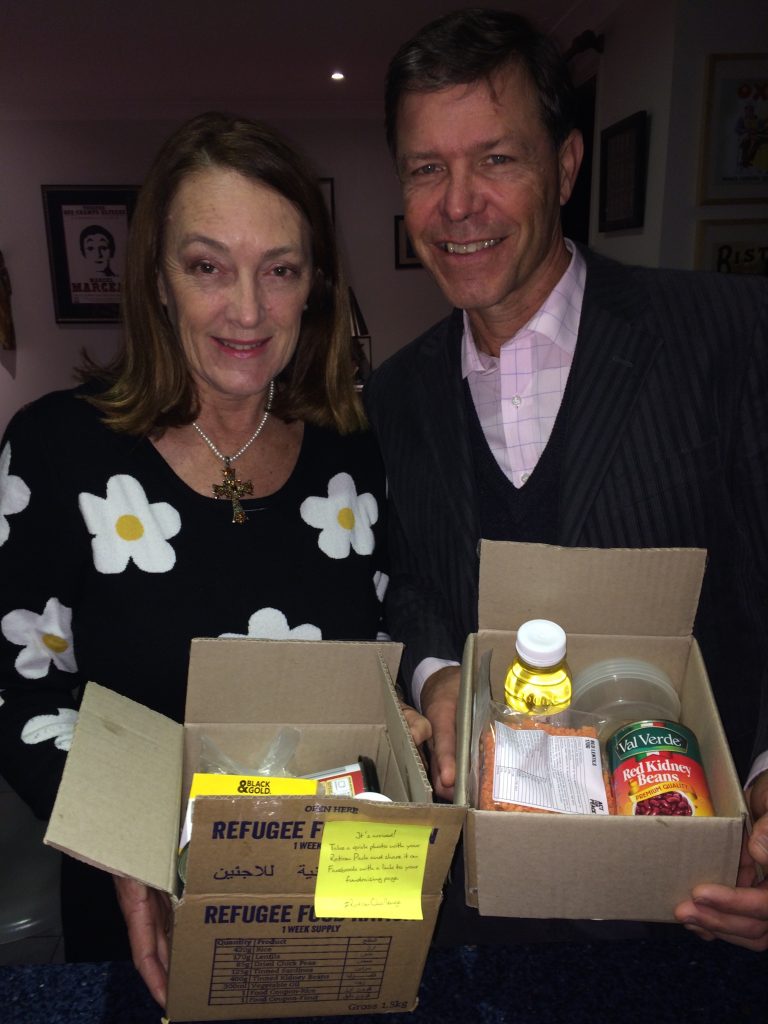Australians suffer a little to help the suffering
Meat, coffee or alcohol not allowed during refugee fundraiser
“This week is a bit of time out for us, to understand their lives,” explains Mark Dando about why he and his wife are eating only what is contained within the ration pack given to Syrian refugees living in a camp in Jordan.
While it was a desire to better grasp what refugees go through that prompted Mark’s involvement in Act for Peace’s Ration Challenge, Kim Vanden Hengel has not been able to shake the impact of seeing the movement of Syrian refugees across Europe last summer. Like millions of people across the world, she was appalled by the number of Syrian refugees drowning in the Mediterranean Sea.
“You can’t get the suffering out of your head,” says Kim, which is why she and her husband, Bart, have teamed with their daughter and her partner in starving themselves for a week as part of Ration Challenge. The fundraiser is being held this week to coincide with Refugee Week (June 18-24).

Kim and Bart Vanden Hengel are among 15,000 Australians subsisting on a refugee’s rations for a week to help raise funds for refugees. Kim Vanden Hengel
About 15,000 people have registered across Australia for this year’s Ration Challenge. They have received a ration pack containing a small amount of rice, lentils, chick peas, beans, fish and oil – the same supplies given to a Syrian refugee living in a camp in Jordan.
No meat, coffee or alcohol are allowed, but there are opportunities to earn rewards at different sponsorship levels. For example, 170g of fresh vegetables can be added if your sponsorship total reaches $500.
As former missionaries in Niger, Kim and Bart are practised fundraisers, with the result that their Team Dusty Miller has already raised more than $7000.
“We are old fundraisers from way back, and so we’ve zoomed ahead,” says Kim, who is now retired but worked in the aid and development sector for more than 40 years. Kim was CEO of CNEC Partners International, now called World Share; she also was fundraising manager for Baptist World Aid and philanthropy manager for Reach Out.
“People … see others suffering, I think, and then they give money in support.” – Kim Vanden Hengel
While Kim wasn’t too bothered about having to stretch a single teabag over five cups of tea yesterday, her husband Bart, who is the Rector of Penshurst Anglican Church, found the first day of the challenge, well, challenging.
“Bart does a long day on Sundays. He starts at six and goes through till about nine non-stop and he said by the time he was preaching at night his stomach was doing blips from the hunger.
“But anyway, we’re OK. We’ve often fasted for a day at a time, but it’s just the permanent not having.”
Kim thinks her networks have been moved to sponsor them through the combination of the Syrian refugee crisis and amazement at the starvation-level rations.
“People … see others suffering, I think, and then they give money in support,” she says. “It becomes something you do together and I think social media with that capacity to post immediately and tag people is a very effective way to raise money.
“It’s a sign of how keen Australians are to do something to really engage with the refugee issue.” – Jess Xavier
Act for Peace’s Jess Xavier says the Ration Challenge mushroomed from its official launch in 2015, when 1000 people raised about $450,000, to 2016, when 8000 people raised $2.1 million. This year, 15,000 people across Australia are taking part and have raised $2m already.
“It’s a sign of how keen Australians are to do something to really engage with the refugee issue,” she says. “The funds raised go to our four refugee programmes around the world as well as other programmes affected by disaster and conflict.”
Jess says the main difficulties which participants face is making the rations last a whole week, as well as the lack of variety.
“We’re so used to everything being accessible; so much fresh vegetables and fruit. Anecdotal feedback shows us that doing [Ration Challenge] makes people realise how much choice and abundance we have in Australia.”
“We encourage kids to have a ration dinner with their parents rather than do the whole week.” – Jess Xavier
Act for Peace discourages people under 18 and pregnant women from taking part in the challenge, and encourages anyone with health issues to consult their GP first.
“Sometimes kids do want to take part with parents but we encourage them to have a ration dinner with their parents rather than do the whole week,” she says.
“Lots of parents say if the kids are old enough, it’s a great way to talk to them about this issue because it’s so tangible. It’s an easy access point for kids to learn about refugees.”
Act for Peace’s work began in 1948 with the sending of food and other provisions to help refugees after World War II. On Christmas Day in 1949, Reverend Frank Byatt of Victoria placed an empty bowl on the dinner table and asked all present to give what they considered to be the cost of the meal to support victims of disease, poverty and violence.
Since that first Christmas Bowl 68 years ago, thousands of Australians have helped to provide food, shelter, education, healthcare and training for the world’s most vulnerable. As the international aid agency of the National Council of Churches in Australia and a member of the global ACT alliance, Act for Peace helps communities affected by poverty and conflict in more than 130 countries including Zimbabwe, Ethiopia, Kenya, Afghanistan, Pakistan, Burma, Sri Lanka, India, the Philippines, Palestine, Jordan, Iraq, Indonesia, as well as in the Pacific and with refugee communities in Australia.

